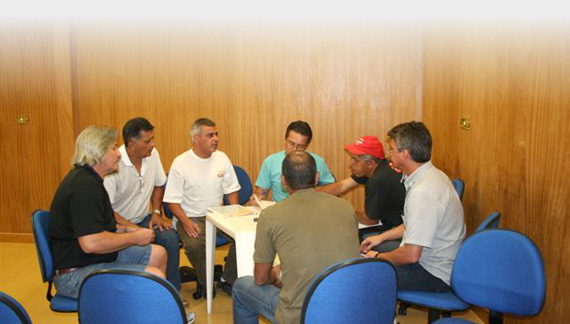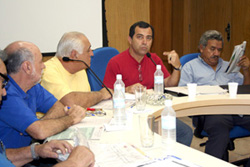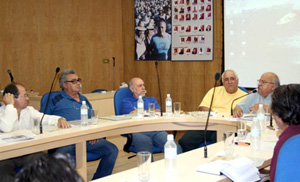Following the establishment of the Labor Union Commission of AmBev Workers of the State of Sao Paulo (COTAESP) last July 17, the First Seminar of AmBev Workers’ Unions was held this month on the 14th and 15th at the headquarters of the Federation of Food Industry Workers of Sao Paulo (FETIASP).
|
The Seminar was attended by the seven food industry unions of the state of Sao Paulo which represent AmBev workers: Agudos, Guarulhos, Jacarei, Jaguariuna, Jundiai, Mogi Mirim, and Sao Paulo, with the Union of Beer and Beverage Industry Workers of Curitiba–Parana, as guest participant.
The welcoming addresses were delivered by Melquíades de Araújo, president of FETIASP; Artur Bueno de Camargo, president of the National Confederation of Food Workers (CNTA); Neuza Barbosa de Lima, on behalf of the IUF, and Siderlei de Oliveira, president of the National Confederation of Food, Cooperative, and Rural Workers (CONTAC).
The round of presentations began with José Carlos da Silva Arouca, legal advisor of FETIASP, who discussed the challenges involved in Collective Bargaining processes. José Silvestre Prado de Oliveira, technical director of the Inter-Union Department of Statistics and Socio-Economic Studies (DIESSE), presented the outcome of an investigation on the growth of the transnational corporation since it launched operations in 2001, as a result of the Antarctica-Brahma merger, which gave the initial thrust to the expansion of Companhia de Bebidas das Américas (AmBev), and Gerardo Iglesias, regional secretary of the IUF, who gave an overview of the challenges faced by the International Committee of AmBev Workers, formed during the Strategic Workshop held in Sao Paulo in November 2005.
For Melquíades de Araújo, “Many transnational companies are very global when it comes to managing their businesses and positioning their products on the international market, but when it comes to dealing with their workers, they act differently from country to country, or, as occurs in Brazil, from one state to another, establishing differences in conventions. How can we change this
|
situation? –the president of the largest federation of food industry workers of Latin America asked. Only by articulating union activities in a larger effort based on coordination and unity, because this has got to change,” he stressed.
CNTA president, Artur Bueno de Camargo, declared that the “Seminar was an instance of unity in reflection, which we must now consolidate through unity in action. This experience –the union leader added– must serve to promote similar instances, with other transnational corporations, if we want to succeed in our struggle. What’s clear is that the merger between Antarctica and Brahma was detrimental to workers, who now, with AmBev, are fewer in numbers, and whose working conditions are worse than six years ago.”
Siderlei de Oliveira highlighted the “satisfaction of knowing we’re on the right track.” “I’m convinced that many fellow workers have grasped the importance of the decisions adopted in the Thirteenth Regional Latin American Conference of the IUF. The unanimous approval of the decision to form Latin American federations in the transnational corporations where the IUF is present was a qualitative step forward. Some may have thought that this would create new ‘apparatuses’; but that’s not so, and this Seminar is proof that we’re on the right track.”
Geraldo Gonçálves Pires (Geraldinho), president of the Dairy Industry Workers’ Union and FETIASP leader, declared that “This has not happened by chance, and it’s nothing new. We’ve been working together with all the unions in the country since the Parmalat crisis, to form the National Commission of Parmalat Workers. Along with Siderlei and Antônio Marcos Tebom of CONTAC, our CNTA affiliates have worked in an atmosphere of great respect and unity, in which the role played by IUF regional division, Rel-UITA, has been key. Now –Geraldinho continued– we are taking on this new challenge with great enthusiasm.”
Neuza Barbosa de Lima, FETIASP Education secretary and member of the International Executive Committee of the IUF, described the Seminar as very positive. “We’ve gathered together leaving behind political banners and with the sole ideological commitment of defending the interests of workers. It’s also exciting to see so many people motivated by this atmosphere of unity, with the predominating conviction that we must bring back the culture of class struggle. There’s no other way!” Neuza sentenced.
 |
|
artículos relacionados
|
28-8-2007 Brasil AmBev Unions form State Commission By Carlos Amorín |

